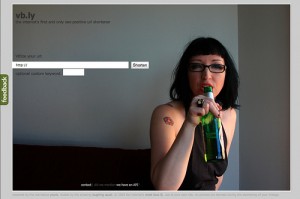 The country has begun cracking down on sites with .ly domains that it deems inappropriate. The URL shortener, vb.ly, which billed itself as a NSFW, sex-positive URL shortener was shut down by NIC.ly (the domain registrar and controlling body for ‘.ly’) because its content was deemed to have fallen “outside of Libyan Islamic/Sharia Law”.
The country has begun cracking down on sites with .ly domains that it deems inappropriate. The URL shortener, vb.ly, which billed itself as a NSFW, sex-positive URL shortener was shut down by NIC.ly (the domain registrar and controlling body for ‘.ly’) because its content was deemed to have fallen “outside of Libyan Islamic/Sharia Law”.
According to one of the co-owners of vb.ly, Ben Metcalfe, the site was taken down by NIC.ly on September 23, 2010 without notice. Through email exchange, NIC.ly informed its owners that the site’s content was “in clear violation of NIC rules and regulations” relating to “text referring to adult content and offensive imagery from [our] main page”.
The offensive imagery referenced is of the bare armed co-owner, sex writer, Violet Blue.
Metcalfe and Blue offer that they were never made aware of the rules and regulations that would have made their site a target for tear down. The fact that their site did not comply with Sharia Law does not appear anywhere in the NIC.ly’s Terms and Conditions, Metcalfe insists.
More than anything this is a tale of exercising caution when doing business with third world Islamic dictatorships. And while you may reside and do business in a country which protects freedom of speech, you can have the rug pulled out from under you by a group you least expect — your foreign domain registrar.
So what of bit.ly and ow.ly? While they do not tout themselves as sex-positive URL shorteners (which was likely part of vb.ly’s undoing), they too are beholden to the laws of Libya. As of June 2010, .ly domains shorter than 4 characters are only allowed for companies and persons having a presence in Libya. Let’s hope they have friends in far off places, or are smart enough to migrate their domains to a more egalitarian registrar.


